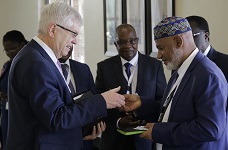Ethiopia becomes 50th member country of CABI, the international not-for-profit organization that improves people’s lives by providing information and applying scientific expertise to solve problems in agriculture and the environment.
Ethiopia will enjoy a range of benefits including input into CABI’s global development agenda, links to its international network of partners as well as regular consultations to address members’ needs, according to the press statement from CABI. Dr Trevor Nicholls, CEO of CABI, confirmed signature of the UN-level Treaty on CABI International by the Government of Ethiopia to bring the country into membership of CABI. The application process of CABI Membership was led by Ethiopia’s Ministry of Agriculture, with whom CABI has a long and beneficial partnership.
Mr Sani Redi Ahmed, the State Minister, Ministry of Agriculture, who had been championing for Ethiopia’s membership of CABI, said, “The Government of Ethiopia is committed to maximising its potential to ensure greater food security for its citizens as well as extend its capabilities for export of key cash crops including coffee.
“We look forward to working with CABI further in respect of trade, commodities and value chain development and market access while looking to build better Sanitary and Phytosanitary Systems (SPS), Pest Risk Analysis (PRA) and other aspects of quarantine for invasive species management.”
Other benefits of membership with CABI that Ethiopia now receives includes voting rights at CABI Review Conferences and Executive Council meetings as well as access to CABI’s broad range of products, services, programmes and project deliveries and capacity-building activities.
Dr Nicholls said, “Membership of CABI will not only consolidate existing relations with Ethiopia but will also strengthen our relationship and shared goals of enhancing the country’s capacity to address and mitigate the rising challenges posed by crop pests and diseases amid a changing global climate. Ethiopia’s membership of CABI will greatly enhance CABI’s position and capability in helping ensure food security and achieve SDGs in Africa and globally.”
Ethiopia has a large domestic market of over 100 million people, making it the second most populous country in Africa after Nigeria and has experienced one of the fastest growing economies in the world with average annual growth rates between 7% and 12%.
Agriculture is the dominant sector of Ethiopia’s economy representing 36.3% of its GDP, 73% of its employment and 76.7% of exports in 2016/17. In 2017/2018, Ethiopia’s major exports included coffee (29.5%), oil seeds (14.9%), pulses (9.5%), Chat (9.3%), cut flowers (8%), and gold (3.5%).
CABI is a partner in Ethiopia’s Agricultural Policy Investment Framework (PIF) which was created in 2010 to operationalise the country’s role in the Comprehensive Africa Agriculture Development Programme (CAADP) which includes driving forward Ethiopia’s agricultural growth and development.
A facet of this is CABI’s role working in partnership to help Ethiopia tackle crop pests and diseases as well as invasive species which threaten the country’s prosperity, food security and biodiversity. Examples include work to examine and mitigate the impact of the invasive alien tree Prosopis juliflora across the Afar Region of north eastern Ethiopia. This is part of an overall strategy of removing barriers to invasive plant management in Africa.
CABI is also working with biological control manufacturers Éléphant Vert, the FAO and national governments and partners, to help in the fight against the desert locust – which is devastating crops across Africa and parts of Asia – that could benefit from the use of the more environmentally sustainable product Green Muscle.
Meanwhile, Ethiopia was one of six East African countries targeted with the aim of strengthening the plant health institutional capacities through the development of an early warning and pest information management system for invasive species such as the fall armyworm.
Other work CABI has also been involved in to help Ethiopia’s agriculture include helping it to tackle coffee diseases as part of the Regional Coffee Wilt Programme as well as improving the quality of coffee in East and Central Africa through enhanced primary processing practices in Ethiopia and Rwanda under the Sustainable Credit Guarantee Scheme for coffee operatives – the first of its kind in Ethiopia.
Furthermore, CABI is utilising a grant from the Gates Foundation to help increase food security in Ethiopia and India through better access to data on soil, agronomy and fertilizers. The country will also benefit from another Gates Foundation-funded project – the African Crop Epidemiology System (ACES) – which aims to implement an early-warning plant health system in Ethiopia and Kenya.
The use of data has also been a key tool in nearly 200 CABI-led networks of Plantwise plant clinics which helps smallholder farmers diagnose and deal with a range of crop pests and diseases. For example, the online Plantwise Knowledge Bank provides farmers and extension workers with a diagnostic tool to identify a pest problem on a crop as well as the ability to sign-up for the very latest pest alerts.
[embedyt] https://www.youtube.com/watch?v=Da5_cyAqZEo[/embedyt][embedyt] https://www.youtube.com/watch?v=Da5_cyAqZEo[/embedyt]

